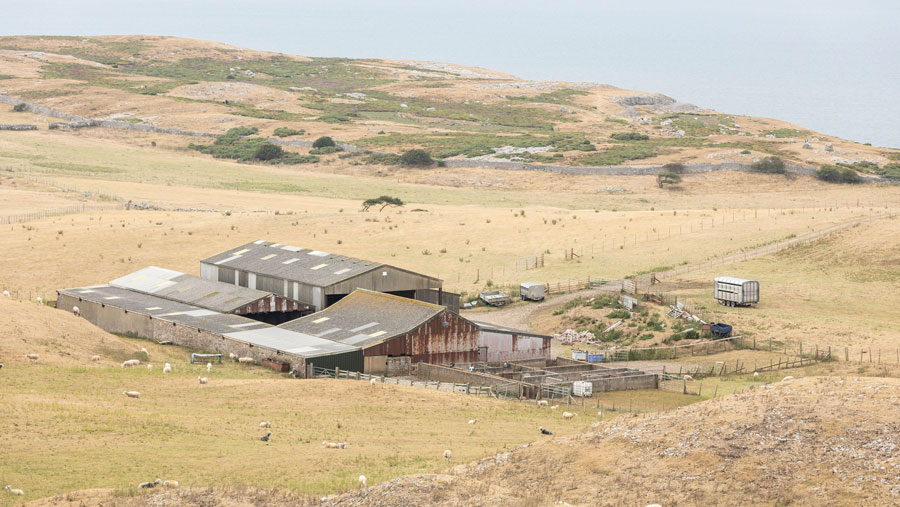This Week in Farming: Drought, sheep prices and moorland fires
 © Raymond Orton/Alamy Stock
© Raymond Orton/Alamy Stock Welcome to This Week in Farming, your weekly catch-up of the best content from the Farmers Weekly website over the past seven days.
Every Saturday we round up the five most eye-catching topics from the website that you might have missed and look ahead to what’s coming up in the FW Podcast.
Water, water – nowhere to be seen
With temperatures soaring again, some arable farmers have been celebrating the earliest finish ever to their harvest, including Norfolk grower David Hillier.
But the lack of water and concrete ground is holding back field work in many areas. However, as David Jones explains in this article on when to drill next season’s oilseed rape crop, “growers need to be guided by soil moisture rather than calendar dates”. Holding off until September should not have too much impact on yields.
But livestock farmers are increasingly concerned about the fodder situation, with grass drying to a crisp and fields that were intended for silage now released for grazing. As Philip Case reports in the lead story in this week’s print edition, many livestock farmers are already feeding winter rations to keep their animals going.
With hotter, drier summers expected in future, our Editorial leader rightly suggests “we need a better plan for water security”.
Mixed news for sheep
Fodder worries to one side, it’s been a mixed picture for sheep producers on the news front.
On a positive note, business reporter Charlie Reeve reports on a tentative recovery for liveweight lamb prices after a big fall, with values up about 20p/kg. The Thame Sheep Fair also saw breeding values hold up well, as strong demand from areas where grass is still growing kept a firm base in prices.
The longer term value of sheepmeat is also borne out in this article, based on a report from the Sustainable Food Trust, which sees a bright future for grass-fed red meat, at the expense of grain-fed white meat. “Chicken and pork would become a more occasional part of our diets, meaning beef, lamb and dairy from pasture-based systems would be the new staple livestock products,” it suggests.
On the downside, is the threat from New Zealand following the free-trade agreement signed in February. We report on the AHDB’s analysis, which suggests the impact of tariff-free sheep imports should be quite muted – unless there are any problems with New Zealand’s sheep trade with China. In today’s turbulent world, what are the chances of that?
While the sun shines…
With soaring fuel costs, it was worrying to note this week that farmers are likely to miss out on the £400 energy bills discount that other householders should receive from government, as Debbie James explains.
On the upside, however, it has emerged that demand for solar panels is on the up among farmers, with Countryfile presenter Adam Henson among the many to put additional panels on his barns, to lower costs and earn additional revenue through sales to the National Grid.
The sunny weather has benefited one Scottish farmer in a different way, as he has managed to grow a large field of sunflowers on the family farm near Perth, into which has been cut a massive footpath in the outline of Scotland. As this article reveals, punters are paying £5 a go to walk the route.
Royal blessing for regenerative
Fans of regenerative farming will have been pleased (though not surprised) to receive a ringing endorsement from the heir to the throne. Addressing the recent World Congress of Soil Science, Prince Charles gave an enthusiastic endorsement of farming approaches that seek to raise the long-term productivity of the soil. Read his words of wisdom here.
Farmers Weekly columnist Ian Pigott also shared his thoughts on regenerative agriculture this week, based on his own experiences and interpretation, calling for a “land sharing” approach to future policies.
Fighting fire with fire
The week ended on 12 August – the “glorious twelfth” in grouse shooting parlance. Combined with the hot, dry weather, what better time to consider the arguments both for an against the practice of controlled moorland burning?
Whatever the arguments around controlled fires, the impact of uncontrolled fires on both arable and livestock farmers was thrown into sharp focus last week, with numerous outbreaks in parched areas. Even Jeremy Clarkson was stopped in his tracks by the risk, as Matilda Bovingdon reports in this field fire round-up.
Listen to the FW Podcast
Don’t forget the latest edition of the Farmers Weekly podcast with Johann Tasker and Hugh Broom, too.
Listen here or bring us with you in the cab by downloading it from your usual podcast platform.

